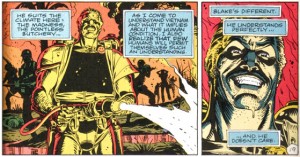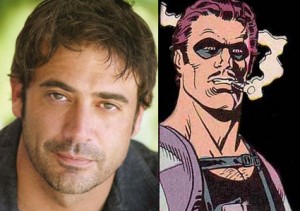There is something devastatingly attractive about a deeply flawed man. Whether it’s the opportunity he provides a woman to try to “fix” him, or the masculine bravado that tends to accompany such flaws, women never fail to fall for these bad boys. One of the most recent examples of this phenomenon is Edward Morgan Blake, Watchmen’s mask-wearing, flame-thrower-wielding Comedian. Listed as one of 10 men “you’d like to hook up with, but really shouldn’t” in a recent Fandomania article by Lyn Cherowbrier, Eddie Blake certainly provides an interesting case study for the mystery of human attraction.
Cited as “the only character in the Watchmen universe who is almost totally unlikeable,” (Grant 2008) and characterized as a cynical, ruthless, nihilistic man, the Comedian nevertheless embodies an idealized representation of masculinity: so virile that he must rape, so steadfast in his convictions that he calls himself the Comedian (“Once you realize what a joke everything is, being the Comedian is the only thing that makes sense”), so strong that he doesn’t protect just one woman, he becomes a costumed hero and protects them all, and yet at the same time so powerful that he is able to gun down a pregnant woman in Vietnam without consequence. The question then becomes “What woman in her right mind would be attracted to a man so morally bankrupt that he murders people simply because he is given the opportunity?” That’s where the magic of comic books and the silver screen come into play. If the Comedian’s muscular physique, attractive face, quick wit and fame as a costumed hero aren’t enough to entice women of the Watchmen universe into the bedroom, they are probably going to be appalled by the Comedian’s actions (as Sally Jupiter and her daughter, Laurie, frequently are). Women outside of the Watchmen universe—comic book consumers and film viewers—have the luxury of being able to separate the Comedian as a sex symbol from the Comedian as a ruthless, heartless killer and to decide which aspects of his character to focus on most.
This separation is achieved in two main ways: first, through the medium of comic books and film itself, and second, through the introduction of the Comedian’s humanity. Because the comic book reader or film viewer is granted a certain degree of omnipotence by the very act of reading or viewing, she is given a more complete picture of the Comedian’s character than an individual who exists within the same diegesis. In other words, where women of the Watchmen universe who are exposed to Blake’s nihilistic nature and ruthless habits (as opposed to his charming smile and rippling pectorals alone) might harbor deep contempt for the man, women outside of that universe are given the luxury of also seeing him at his most human—a drunken moment shared with a life-long enemy in the dark of the early morning.
In this very example we see both of the previously mentioned methods of character separation working together: a reader/viewer may choose to separate the attractive, “bad boy” Comedian from the cynical, violent Comedian much the same way that she might separate the young, virile Comedian seen putting down riots and attending Minutemen meetings from the old, gray Comedian murdered in his own apartment. This is a direct result of media: readers/viewers may pick and choose which aspects of a character to focus on because they know that the character isn’t real, therefore choosing to ignore these less desirable qualities—a man’s flaws— or to view them as attractive, doesn’t feel like a violation of our social nature. Simultaneously, the reader/viewer can choose to give more weight to information that they receive as a result of their position as the reader/viewer—for example, the interaction between the Comedian and his arch enemy, Moloch the Mystic, which establishes Blake’s innate humanity and forces an emotional connection with him. In the Watchmen universe, only Moloch and Rorschach know about Blake’s breakdown, and only Moloch first hand, but everyone who reads or sees Watchmen is granted this insight into the Comedian’s complicated character.
Even if you decide to dismiss all of this out of hand, there still remains one last damning detail that certainly seems to confirm the Comedian’s status as a devastatingly attractive, flawed individual: the willingness of Sally Jupiter, the original Silk Spectre, to have consensual sex with the Comedian after he tried to rape her after one of the Minutemen meetings in the 1940s. This is, again, information that very few individuals within the Watchmen universe are privy to but to which readers/viewers have easy access given their position as such. Perhaps expressed best in the film, all doubt over the incident is removed when Laurie, Sally Jupiter’s daughter with Edward Blake, finally asks her mother how she could sleep with a man who tried to rape her. “You asked why I couldn’t stay mad at Eddie,” Sally says to her daughter, “He gave me you.” This cements the Comedian’s humanity for the female viewer. Despite everything else he has done, and in light of his recent demise, the Comedian is responsible for the creation of the film’s strongest female character and role model.
So for those of you female comic book readers and moviegoers out there who have a soft spot for Edward Blake, don’t despair. Pining over the Comedian isn’t the worst thing that you could do. Throughout both the Watchmen graphic novel and movie, Edward Blake is constructed not only as a lunatic, but as a handsome, charismatic, and devastatingly attractive lunatic. Don’t feel bad about loving the character who most clearly grasps the meaning of the costumed hero in a world plagued by human nature (the Comedian tells Night Owl II (Dan Dreiberg) when he asks what the costumed heroes are “society’s only protection” from, “You kidding me? From themselves!”). In fact, it’s actually safer to love Edward Blake than it is to bring home that unbearably hot porn-addicted guy you met at Starbucks the other day and try to fix him. While that will probably end in tragedy, a love affair with the Comedian will always end the same way: by closing the book, turning off the television, and choosing to focus your attention elsewhere.











You’re 100% right. Two of my friends, neither whom were Watchmen fans, saw the film and immediately are Comedian fans. They love him, and when I ask why, even after all the terrible things he does, they just repond with “because I just do :D!”